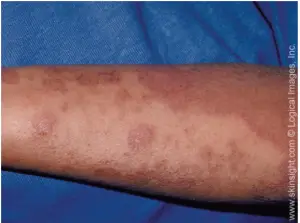Allergies appear when the immune system reacts to a foreign substance such as pollen, bee venom, pet hair or a certain type of food, in this case, your immune system produces antibodies that identify a particular allergen as harmful, even if it is not. When you come into contact with the allergen, the reaction of your immune system can cause the skin, sinuses, respiratory tract or digestive system to swell.

The severity of allergies varies by person and can range from minor irritation to anaphylaxis (a life-threatening emergency). While most allergies have no cure, treatments can help relieve allergic symptoms.
Main symptoms of allergies.
Allergy symptoms, which depend on the substance involved, can affect the airways, sinuses and nostrils, skin and digestive system. Allergic reactions can range from mild to severe. In some severe cases, allergies can trigger a life-threatening reaction, which is known as “anaphylaxis.”
Hay fever also called “allergic rhinitis” can cause: sneezing, itchy nose, eyes or palate, mucus, stuffy nose, watery, irritated or swollen eyes (conjunctivitis).
Food allergies can incite tingling in the mouth, swelling of the lips, tongue, face or throat, urticaria.
An allergy from an insect bite can cause an area of a large swelling (edema) at the site of the bite. Itching or hives throughout the body. Cough, chest tightness, wheezing or shortness of breath.
An allergy to a medication can cause Urticaria. Skin itch. Acne. Swelling of the face and Wheezing.
What is atopic dermatitis?

It is an allergic skin disorder also called «eczema», it can cause: Itch and Red skin flakes.
Some types of allergies, such as food allergies and insect bites, can trigger a serious reaction known as “anaphylaxis.”, a life-threatening medical emergency, which can cause you to go into shock. Some of the signs and symptoms of anaphylaxis are the following: Loss of consciousness Drop in blood pressure. Severe difficulty breathing. Dazeness. Fast and weak pulse. Nausea and vomiting.
When to consult the doctor.
You may consult a doctor if you have symptoms that you think are caused by an allergy and over-the-counter allergy medications do not provide enough relief. If you have symptoms after starting a new medication, call the doctor who prescribed it immediately.
In the case of a severe allergic reaction (anaphylaxis), immediately call your local emergency number. If you carry self-injectable epinephrine (Auvi-Q, EpiPen or others), inject yourself immediately. Even if your symptoms improve after an epinephrine injection, you should go to the emergency health service to make sure the symptoms do not return when the injection effects pass. The evaluation, diagnosis, and control of anaphylaxis are complicated, so you should without any doubt see a doctor who specializes in allergies and immunology.
Know the possible causes.
An allergy begins when your immune system confuses a normally harmless substance with a dangerous invader. The immune system produces antibodies that remain alert concerning that particular allergen. When you are exposed to the allergen again, these antibodies can release some chemicals from the immune system, such as histamine, that cause allergy symptoms.

